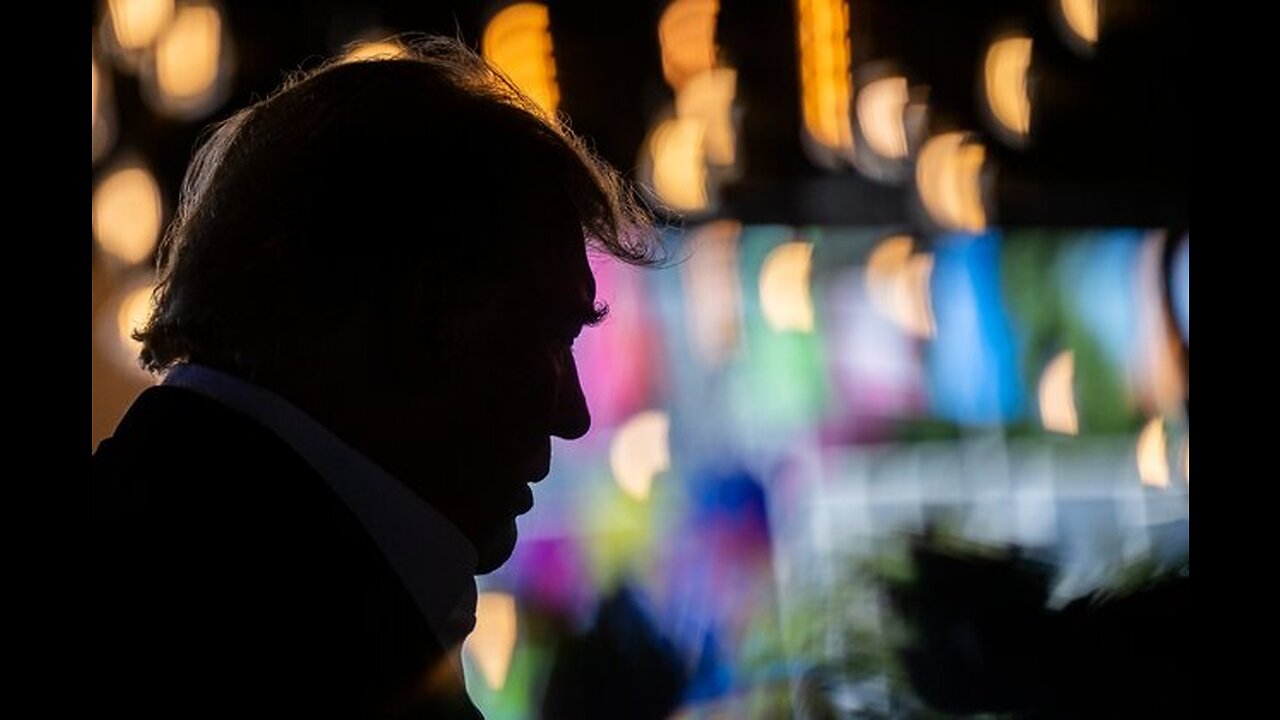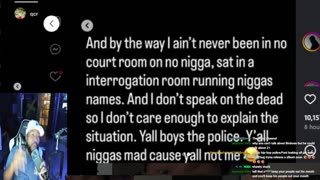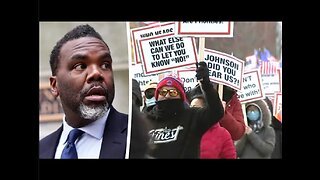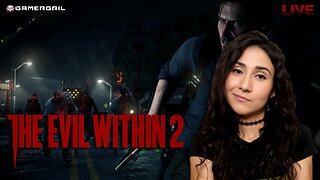Premium Only Content

Trump Team Re-Ups Prosecutor Jab on Eve of Surrender
Trump Team Re-Ups Prosecutor Jab on Eve of Surrender
Trump’s campaign highlighted a plan to fire ‘radical’ prosecutors if he returns to the presidency a day before his surrender on federal election conspiracy charges in Georgia.
On the night of the first GOP presidential debate, as Donald Trump’s political rivals discussed immigration, abortion, China and education, the absent former president’s campaign shared a slew of policy videos. At first blush, the move might seem to be an unremarkable attempt to stay in the discussion. But among the agenda items aimed at ending the “nightmare” of homelessness, protecting students from liberal ideology “infecting educational institutions” and a plan to “restore law and order” was a proposal with a sharper edge – one for eliminating prosecutions as we know them.
The choice was curious for a candidate who is also a defendant facing criminal processing on Thursday – one who has been warned as a condition of release not to do anything that could be construed as intimidating witnesses, co-conspirators or basically anyone in the legal system. And it highlights the narrow space between Trump’s political messaging and threats of retribution he has been prohibited from delivering.
In the video, dubbed “Firing the Radical Marxist Prosecutors Destroying America,” Trump pledges to “restore the scales of justice in America” and end the “weaponization” of the justice system at the hand of “Marxist local district attorneys,” with a plan to overhaul the Justice Department and order investigations into district attorneys, while appointing 100 U.S. attorneys who will be the “polar opposite” of those he says are destroying the rule of law.
“As we completely overhaul the federal Department of Justice and FBI, we will also launch sweeping civil rights investigations into Marxist local District Attorneys,” Trump said, claiming the prosecutors had engaged in illegal selective enforcement.
The video – part of Trump’s broader Agenda 47, a loose collection of priorities if he were to win the White House and become the 47th president that Trump also shared on social media Wednesday night – was initially released on April 13. That was the day he appeared for a deposition in New York in a case brought by Attorney General Letitia James, who has for years been among the foremost targets of Trump’s ire. But it also mirrors language Trump has used to disparage Atlanta District Attorney Fani Willis, who brought the charges in an election interference case to which Trump is expected to surrender on Thursday.
The former president, who insists he has done nothing wrong, is set to be booked on the charges after his legal team agreed to his release conditions earlier this week. Among the conditions, which are far more voluminous than those agreed to by the other defendants, Trump must not intimidate co-defendants, witnesses, unindicted co-conspirators, any victim, the community or property within the community, or “otherwise obstruct the administration of justice.” The order stipulates that such intimidation – “no direct or indirect threat of any nature” – includes posts on social media or reposts of posts made by others on social media.
The social media restriction is notable given Trump’s penchant for plentiful posts about those who he says have wronged him. Since the agreement, signed on Monday, Trump’s rhetoric about the case has appeared to dwindle. Even so, he shared a video from Georgia Lt. Gov. Burt Jones on Wednesday that claimed Willis had “funneled millions of taxpayer dollars into her self-serving pursuits,” while Atlanta’s crime “goes unchecked.” And on Monday, hours after the agreement, Trump balked at his upcoming arrest by the “radical left district attorney.”
U.S. News & World Report
More
DES MOINES, IOWA - AUGUST 12: Republican presidential candidate and former U.S. President Donald Trump speaks during a rally at the Steer N' Stein bar at the Iowa State Fair on August 12, 2023 in Des Moines, Iowa. Republican and Democratic presidential hopefuls, including Florida Gov. Ron DeSantis, former President Donald Trump are visiting the fair, a tradition in one of the first states to hold caucuses in 2024. (Photo by Brandon Bell/Getty Images)
Republican presidential candidate and former U.S. President Donald Trump speaks during a rally at the Steer N' Stein bar at the Iowa State Fair on August 12, 2023 in Des Moines, Iowa.(BRANDON BELL/GETTY IMAGES)
On the night of the first GOP presidential debate, as Donald Trump’s political rivals discussed immigration, abortion, China and education, the absent former president’s campaign shared a slew of policy videos. At first blush, the move might seem to be an unremarkable attempt to stay in the discussion. But among the agenda items aimed at ending the “nightmare” of homelessness, protecting students from liberal ideology “infecting educational institutions” and a plan to “restore law and order” was a proposal with a sharper edge – one for eliminating prosecutions as we know them.
The choice was curious for a candidate who is also a defendant facing criminal processing on Thursday – one who has been warned as a condition of release not to do anything that could be construed as intimidating witnesses, co-conspirators or basically anyone in the legal system. And it highlights the narrow space between Trump’s political messaging and threats of retribution he has been prohibited from delivering.
Recommended Videos
Powered by AnyClip
Trump Faces Stronger Opposition and Biden Gets Mixed Views for 2024 Election
3.8K
3
Play Video
In the video, dubbed “Firing the Radical Marxist Prosecutors Destroying America,” Trump pledges to “restore the scales of justice in America” and end the “weaponization” of the justice system at the hand of “Marxist local district attorneys,” with a plan to overhaul the Justice Department and order investigations into district attorneys, while appointing 100 U.S. attorneys who will be the “polar opposite” of those he says are destroying the rule of law.
“As we completely overhaul the federal Department of Justice and FBI, we will also launch sweeping civil rights investigations into Marxist local District Attorneys,” Trump said, claiming the prosecutors had engaged in illegal selective enforcement.
The video – part of Trump’s broader Agenda 47, a loose collection of priorities if he were to win the White House and become the 47th president that Trump also shared on social media Wednesday night – was initially released on April 13. That was the day he appeared for a deposition in New York in a case brought by Attorney General Letitia James, who has for years been among the foremost targets of Trump’s ire. But it also mirrors language Trump has used to disparage Atlanta District Attorney Fani Willis, who brought the charges in an election interference case to which Trump is expected to surrender on Thursday.
Cartoons on Donald Trump's Indictments
View All 63 Images
The former president, who insists he has done nothing wrong, is set to be booked on the charges after his legal team agreed to his release conditions earlier this week. Among the conditions, which are far more voluminous than those agreed to by the other defendants, Trump must not intimidate co-defendants, witnesses, unindicted co-conspirators, any victim, the community or property within the community, or “otherwise obstruct the administration of justice.” The order stipulates that such intimidation – “no direct or indirect threat of any nature” – includes posts on social media or reposts of posts made by others on social media.
The social media restriction is notable given Trump’s penchant for plentiful posts about those who he says have wronged him. Since the agreement, signed on Monday, Trump’s rhetoric about the case has appeared to dwindle. Even so, he shared a video from Georgia Lt. Gov. Burt Jones on Wednesday that claimed Willis had “funneled millions of taxpayer dollars into her self-serving pursuits,” while Atlanta’s crime “goes unchecked.” And on Monday, hours after the agreement, Trump balked at his upcoming arrest by the “radical left district attorney.”
The issue has arisen in other cases the former president faces as well, including in the Jan. 6 case where prosecutors sought a protective order after Trump appeared to make comments related to the case in a post on social media, in what they argued was part of a pattern of the former president posting about ongoing cases – and sometimes going after judges and attorneys in the process.
Meanwhile, Trump’s surrogates have maintained pressure on Willis, as they have in the other cases he faces, like on Thursday when the House Judiciary Committee opened an investigation into the district attorney, claiming that her pursuit of the charges against Trump is politically motivated, and requesting documents related to the case.
It’s likely part of a strategy Trump will employ going forward, as his speech comes under the microscope, while he tests a fine legal line in the march toward four criminal trials amid a presidential campaign.
-
 LIVE
LIVE
BooniesHQ
1 hour agoGame Of SKATE Shaun Hover Vs. Jeff DeChesare: Boonies Skate Night 1
8,134 watching -
 LIVE
LIVE
SpartakusLIVE
1 hour agoThe HUGEST Brain (not forehead) delivers Saturday SPARTOONS || Variety Later - Shadow of Mordor
276 watching -
 LIVE
LIVE
Akademiks
4 hours agoWar in RAT-LANTA. Young Thug vs Gunna vs Ralo vs YSL MONDO. Who Will Le Bebe Pick. FINAL CRASHOUT!
4,606 watching -
 21:55
21:55
MYLUNCHBREAK CHANNEL PAGE
1 day agoFault Lines are GATES - Pt 3
8.15K4 -
 LIVE
LIVE
Sgt Wilky Plays
2 hours agoRumble Gaming Bad Company Presents WARZONEPALOOZA
133 watching -
 LIVE
LIVE
Rallied
1 hour ago $0.40 earnedSolo Challenges ALL DAY
88 watching -
 17:54
17:54
Nate The Lawyer
5 hours ago $1.38 earnedChicago Mayor’s $600M Migrant Spending Leaves City $1.1B Budget CRISIS.
5.8K22 -
 LIVE
LIVE
GritsGG
6 hours agoRumble Customs! 3515 Ws! 🫡!
204 watching -
 LIVE
LIVE
cosmicvandenim
15 hours agoVAN DENIM x RALLIED & GRITS | Team 6: Denim Grit | Warzonepalooza Tournament
226 watching -
 LIVE
LIVE
GamerGril
2 hours ago💕 The Evil Within 2 💕 | First Time Playthrough | Backseat Gaming Encouraged
79 watching